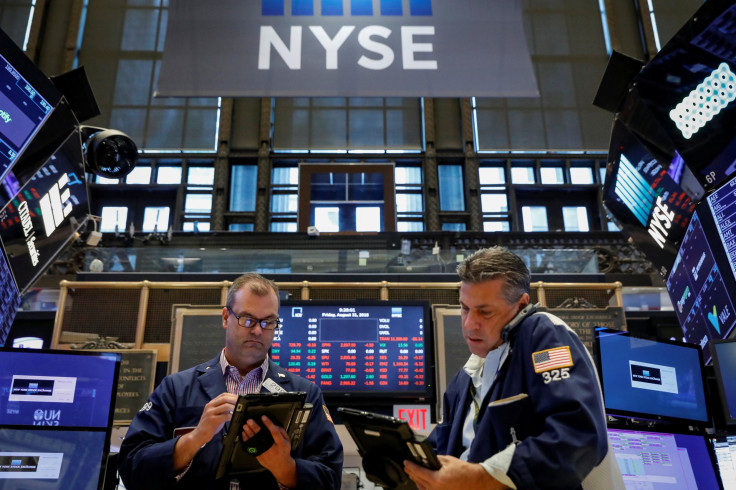Monday's Stock Market Close: Dow Soars Record 1,294 Points, As Market Rebounds From Last Week's Sell-Off

KEY POINTS
- Central banks in Europe and Japan pledged to enact steps to minimize effects of virus on economies
- OECD warned global GDP growth might only be 1.5% this year
- Dow posted its biggest one-day gain in history
U.S. stocks soared on Monday after central banks in Europe and Japan pledged to take steps to prevent the negative impact of the coronavirus on their economies and financial markets. In a frantic rally during the final hour of trading, the Dow logged the biggest one-day gain in history.
The Dow Jones Industrial Average skyrocketed 1,293.96 points to 26,703.32 while the S&P 500 rose 136.01 points to 3,090.23 and the Nasdaq Composite Index advanced 384.8 points to 8,952.16.
The previous record one-day gain for the Dow occurred on Dec. 26, 2018 when the index surged 1,086.25 points.
Monday's volume on the New York Stock Exchange totaled 5 billion shares with 2,421 issues advancing, 16 setting new highs, and 601 declining, with 175 setting new lows.
Active movers were led by Bank of America Corp. (BAC), General Electric Co. (GE) and Advanced Micro Devices Inc. (AMD).
More than 89,000 global cases of coronavirus were confirmed as of Monday in more than 60 countries, with more than 3,000 virus-related deaths. The U.S., Australia and Thailand reported their first virus-related deaths over the weekend, while South Korea reported almost 500 new cases and Italy now has almost 1,700 cases.
U.S. President Donald Trump asked pharmaceutical executives to speed up development of a vaccine for coronavirus.
Major central banks, the European Central Bank, the Bank of England and Bank of Japan, all pledged to take steps to minimize the economic impact of the virus.
“The Governing Council stands ready to adjust all its instruments, as appropriate, to ensure that inflation moves towards its aim in a sustained manner,” ECB Vice President Luis de Guindos said Monday.
Bank of Japan said: "The BoJ will monitor developments carefully, and strive to stabilize markets and offer sufficient liquidity via market operations and asset purchases."
“The market has been conditioned to buy on any weakness,” said Keith Buchanan, portfolio manager at GLOBALT. “I think we’ll look back at these past few years at some point as some level of complacency. Buying the dip takes more bravery now.”
Manufacturing data from China uncovered the damage done by virus-related shutdowns. The Caixin/Markit Manufacturing Purchasing Managers’ Index registered 40.3 for February, well below expectations. China’s official manufacturing PMI plunged to a record low of 35.7 in February, from 50 in January.
The Organization for Economic Cooperation and Development warned that global gross domestic growth could plunge to 1.5%, down from its prior 2.9% growth projection.
“The ultimate risk factor in our view is the U.S. consumer,” said Gregory Faranello, head of U.S. rates trading at AmeriVet Securities. “We have coronavirus cases showing up in the U.S. To the extent that that continues to spread, which we all hope will not be the case, the risk factor for the Fed grows because this now is no longer something that they can point the finger to relative to tariffs and say the global economy is slow, but we’re okay.”
The Institute for Supply Management’s Purchasing Manager’s Index fell to 50.1 in February from 50.9 in January.
The Commerce Department said Monday that U.S. construction spending rose by 1.8% in January to a record annual rate of $1.37 trillion.
Overnight in Asia, markets rebounded. China’s Shanghai Composite jumped 3.15%, while Hong Kong’s Hang Seng rose 0.62%, and Japan’s Nikkei-225 gained 0.95%.
In Europe markets finished mixed as Britain’s FTSE-100 gained 1.13%, France’s CAC-40 gained 0.44% and Germany’s DAX dropped 0.27%.
Crude oil futures jumped 5.79% at $47.35 per barrel and Brent crude gained 1.33% at $52.59. Gold futures rose 1.31%.
The euro rose 0.93% at $1.1128 while the pound sterling slipped 0.41% at $1.2763.
The yield on the 10-year Treasury plunged 3.46% to 1.088% while yield on the 30-year Treasury dropped 1.5% to 1.646%.
© Copyright IBTimes 2025. All rights reserved.





















